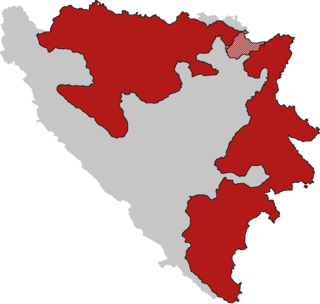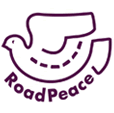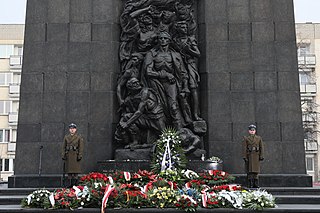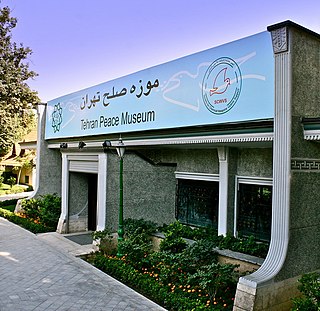
Republika Srpska is one of the two entities of Bosnia and Herzegovina, the other being the Federation of Bosnia and Herzegovina. It is located in the north and east of the country. Its largest city and administrative centre is Banja Luka, lying on the Vrbas river.

Road traffic safety refers to the methods and measures used to prevent road users from being killed or seriously injured. Typical road users include pedestrians, cyclists, motorists, vehicle passengers, horse riders, and passengers of on-road public transport.

Memorial is an international human rights organisation, founded in Russia during the fall of the Soviet Union to study and examine the human rights violations and other crimes committed under Joseph Stalin's reign. Prior to its dissolution in Russia, it consisted of two separate legal entities, Memorial International, whose purpose was the recording of the crimes against humanity committed in the Soviet Union, particularly during the Stalinist era, and the Memorial Human Rights Centre, which focused on the protection of human rights, especially in conflict zones in and around modern Russia. A movement rather than a centralized organization, as of December 2021 Memorial encompassed over 50 organisations in Russia and 11 in other countries, including Kazakhstan, Ukraine, Germany, Italy, Belgium and France. Although the focus of affiliated groups differs from region to region, they share similar concerns about human rights, documenting the past, educating young people and marking remembrance days for the victims of political repression.

Gedenkdienst is the concept of facing and taking responsibility for the darkest chapters of one's own country's history while ideally being financially supported by one's own country's government to do so. Founded in Austria in 1992 by Andreas Maislinger the Gedenkdienst is an alternative to Austria's compulsory national military service as well as a volunteering platform for Austrians to work in Holocaust- and Jewish culture-related institutions around the world with governmental financial support. In Austria it is also referred to as Austrian Holocaust Memorial Service provided by the Austrian Service Abroad. The Austrian Gedenkdienst serves the remembrance of the crimes of Nazism, commemorates its victims and supports Jewish cultural future. The program is rooted in the acknoledgment of responsibility by the Austrian government for the crimes committed by National Socialism.
The International Federation for Human Rights is a non-governmental federation for human rights organizations. Founded in 1922, FIDH is the third oldest international human rights organization worldwide after Anti-Slavery International and Save the Children. As of 2016, the organization is made up of 184 members including Ligue des droits de l'homme in over 100 countries.

RoadPeace is the national charity for road crash victims in the UK. It supports the people affected by road crashes with emotional and practical support and advocacy. It operates a help line and provides practical support to people affected. RoadPeace founded the World Day of Remembrance for Road Traffic Victims and established the RoadPeace Wood within the National Memorial Arboretum.

The International Holocaust Remembrance Day, or the International Day in Memory of the Victims of the Holocaust, is an international memorial day on 27 January that commemorates the victims of the Holocaust, which resulted in the murder of one third of the Jewish people, along with countless members of other minorities between 1933 and 1945 by Nazi Germany, an attempt to implement their "final solution" to the Jewish question. 27 January was chosen to commemorate the date when the Auschwitz concentration camp was liberated by the Red Army in 1945.

The International Federation of Red Cross and Red Crescent Societies (IFRC) is a worldwide humanitarian aid organization that reaches 160 million people each year through its 192-member National Societies. It acts before, during and after disasters and health emergencies to meet the needs and improve the lives of vulnerable people. It does so with impartiality as to nationality, race, gender, religious beliefs, class and political opinions.

The World Day of Remembrance for Road Traffic Victims takes place on the third Sunday in November every year as the appropriate acknowledgment of victims of road traffic crashes and their families. It was started by the British road crash victim charity, RoadPeace, in 1993 and was adopted by the United Nations General Assembly in 2005.
The World Holocaust Forum is a series of events aimed at preserving the memory of the Holocaust. It is also known as the "Let My People Live!" Forum.

The Black Ribbon Day, officially known in the European Union as the European Day of Remembrance for Victims of Stalinism and Nazism and also referred to as the Europe-wide Day of Remembrance for the victims of all totalitarian and authoritarian regimes, is an international day of remembrance for victims of totalitarianism regimes, specifically Stalinist, communist, Nazi and fascist regimes. Formally recognised by the European Union, the Organization for Security and Co-operation in Europe and some other countries, it is observed on 23 August. It symbolises the rejection of "extremism, intolerance and oppression" according to the European Union. The purpose of the Day of Remembrance is to preserve the memory of the victims of mass deportations and exterminations, while promoting democratic values to reinforce peace and stability in Europe. It is one of the two official remembrance days or observances of the European Union, alongside Europe Day. Under the name Black Ribbon Day it is an official remembrance day of Canada. The European Union has used both names alongside each other.

The Prague Declaration on European Conscience and Communism was a declaration which was initiated by the Czech government and signed on 3 June 2008 by prominent European politicians, former political prisoners and historians, among them former Czech President Václav Havel and future German President Joachim Gauck, calling for "Europe-wide condemnation of, and education about, the crimes of communism." Much of the content of the declaration reproduced demands formulated by the European People's Party in 2004, and draws heavily on the theory or conception of totalitarianism.
The World Veterans Federation (WVF) is the world's largest international veteran organisation. The federation consists of 172 veterans organizations from 121 countries representing some 60 million veterans worldwide.
Michael Feeney, MBE, is the founder of the County Mayo Peace Park and Garden of Remembrance. An Irish citizen he was awarded the MBE due to his services in promoting British-Irish relations by Queen Elizabeth II at a ceremony at Buckingham Palace in the Queen's New Year Honours List in 2010.
The FIMCAP, which is short for Fédération Internationale des Mouvements Catholiques d’Action Paroissiale, is an umbrella organization for Catholic youth organizations. Its 31 member organizations are based in 28 countries. The FIMCAP was founded in 1962 and is recognised as an official Catholic organization by the Dicastery for Laity, Family and Life. FIMCAP is also a full member of the European Youth Forum.
The United Nations Road Safety Collaboration (UNRSC) is an informal consultative mechanism whose members are committed to road safety efforts and in particular to the implementation of the recommendations of the World report on road traffic injury prevention.

The Tehran Peace Museum is a member of the International Network of Museums for Peace. The main objective of the museum is to promote a culture of peace through raising awareness about the devastating consequences of war, with a focus on the health and environmental impacts of chemical weapons.

Traffic collisions in India are a major source of deaths, injuries and property damage every year. The National Crime Records Bureau (NCRB) 2021 report states that there were 155,622 fatalities, highest since 2014, out of which 69,240 deaths were due to two-wheelers. A study by Insurance Institute for Highway Safety, U.S. shows that the use of seat belts significantly reduces the risks and injuries from road accidents, and yet there is no enforcement on use of seat belts in cars. A study by IIT Delhi points out that the national highways constitute only 2% of the length of roads in India, but they account for 30.3% of total road accidents and 36% of deaths.
The Seventy Years Declaration was a declaration initiated by academics Dovid Katz and Danny Ben-Moshe and released on 20 January 2012 to protest against the policies of several European states and European Union bodies on the evaluation, remembrance and prosecution of crimes committed under communist dictatorships in Europe, specifically policies of many European countries and the EU treating the Nazi and Stalinist regimes in Eastern and Central Europe as equally criminal. Presented as a response to the Prague Declaration on European Conscience and Communism initiated by the Czech government in 2008 to condemn communism as totalitarian and criminal, it explicitly rejects the idea that the regimes of Joseph Stalin and Adolf Hitler are morally equivalent, i.e. the totalitarianism theory that was popularized by academics such as Hannah Arendt, Carl Friedrich and Zbigniew Brzezinski and became dominant in Western political discourse during the Cold War, and that has gained new momentum in many new EU member states following the fall of communism, resulting in international resolutions, establishment of research institutes and museums, and a day of remembrance. The declaration also states that communist regimes did not commit genocides, citing the 1948 Genocide Convention which restricts genocide to mass killings related to ethnicity, race, nationality, or religion. The declaration advances the position that the Holocaust was unique, a subject of some debate. The declaration was signed by 70, mostly left-wing, parliamentarians from Europe. It was released on the 70th anniversary of the Wannsee Conference in Berlin.











